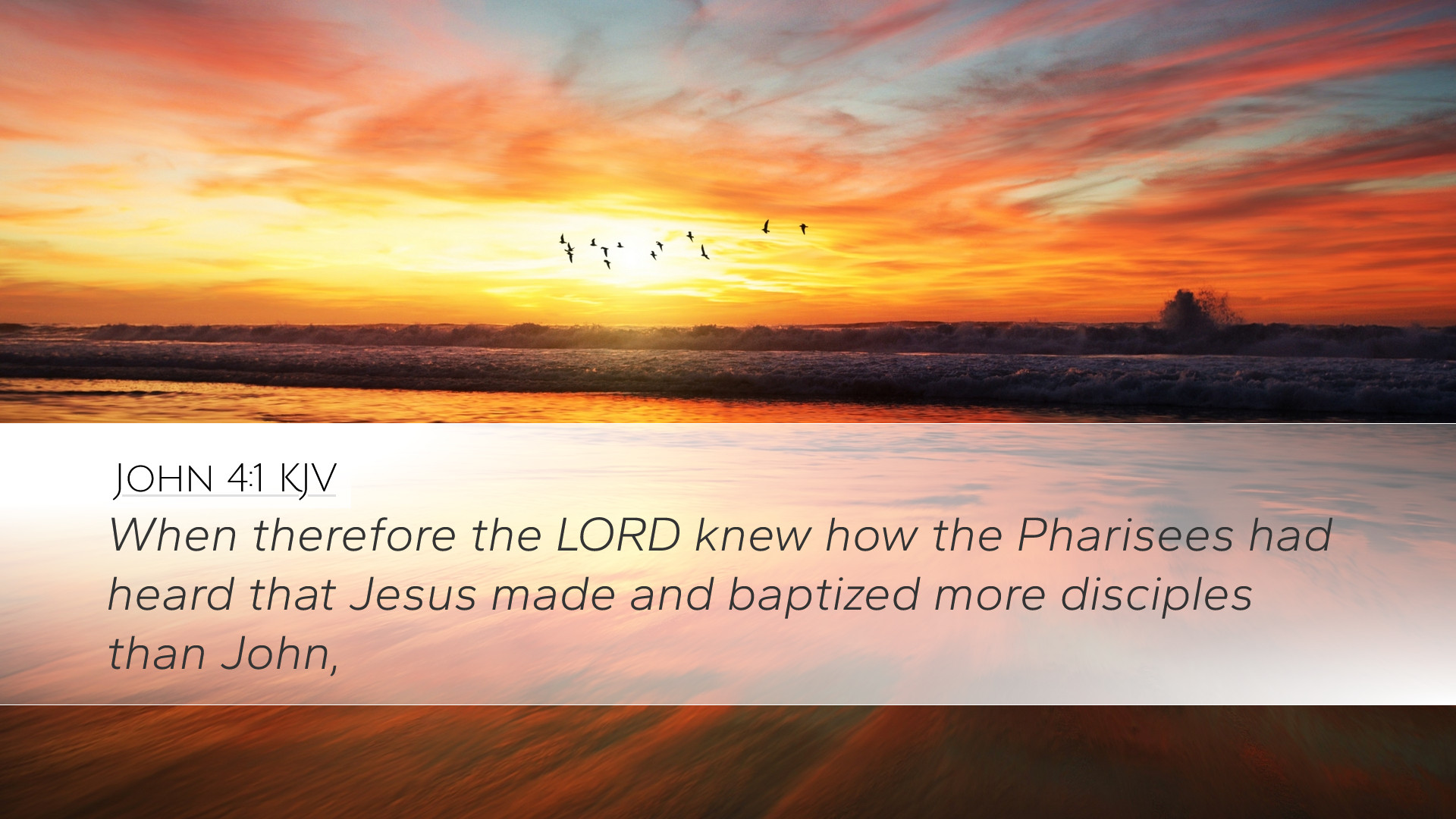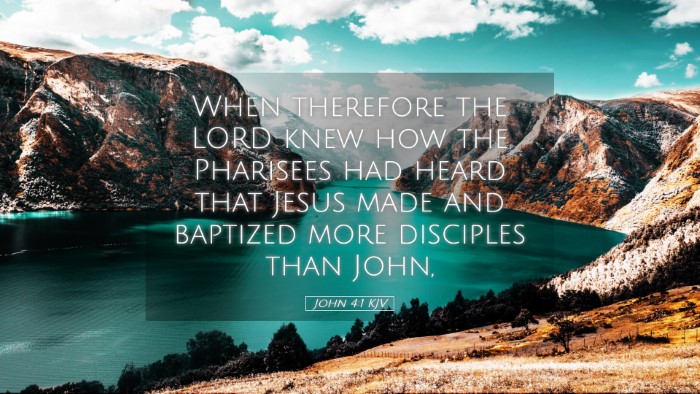Commentary on John 4:1
Introduction
John 4:1 states: "Therefore, when the Lord knew that the Pharisees had heard that Jesus made and baptized more disciples than John." This verse introduces a significant transition in Jesus' ministry, highlighting the growing influence of His teachings and the reactions from religious authorities. The insights from various public domain commentaries will provide a deeper understanding of this scripture, its context, and its implications.
Contextual Overview
In the preceding chapters, particularly in John 3, we witness a detailed exposition of Jesus’ conversation with Nicodemus, a Pharisee. This dialogue sets the stage for the unfolding narrative in chapter 4, where the ministry of Jesus continues to expand beyond the confines of Jerusalem. The mention of the Pharisees serves to remind us of the religious backdrop in which Jesus operates.
Insights from Matthew Henry
Matthew Henry emphasizes that this verse signals a crucial moment when Jesus becomes increasingly aware of the growing tensions with the Pharisees. He notes that although Jesus’ ministry was accompanied by success, it also attracted scrutiny.
-
Growth of Jesus' Ministry: Henry points out that the disciples were becoming more numerous as they preached Christ, highlighting the Lord's commanding authority over both the message and the messenger.
-
Pharisaic Opposition: The Pharisees, always vigilant regarding their influence, escalate their observations about Jesus' actions. Henry remarks that such scrutiny often serves to fulfill divine purposes, prompting Jesus to navigate His ministry with wisdom and discernment.
Insights from Albert Barnes
Albert Barnes offers a more analytical viewpoint, focusing on the implications of Jesus’ baptism and the disciples’ role in it. He points out that the act of baptism itself can be misunderstood, countering the idea that it merely symbolizes a rite for forgiveness.
-
The Nature of Jesus' Baptism: Barnes argues that although Jesus did not personally baptize (as clarified in John 4:2), the act performed by His disciples should not be diminished. It represents a transition into a new covenant atmosphere.
-
Jesus' Strategic Withdrawal: Barnes highlights the wisdom of Jesus in choosing to move away from Judea, a decision shaped by the awareness of rising tensions. This move not only protects Him but also allows for further outreach, forecasting the coming acceptance of Gentiles.
Insights from Adam Clarke
Adam Clarke explores the broader implications of this verse in the context of apostolic authority and the establishment of the early Christian church. Clarke recognizes the transition from John's ministry to that of Jesus as a formative period.
-
Contrast with John the Baptist: Clarke makes an important note regarding the relationship of Jesus to John. While John’s ministry was essential for paving the way, Jesus builds upon this foundation, prompting a necessary change in the social and religious landscape of the time.
-
Emergence of Discipleship: The passage points to the beginning of the disciples assuming a more active role in ministry. Clarke posits that this is a foreshadowing of the Great Commission, where the apostles are tasked with spreading the gospel worldwide.
Theological Implications
The theological significance of John 4:1 extends beyond the narrative itself. Each commentary suggests that the growing ministry of Jesus serves as a precursor to the universal gospel message.
-
Divine Timing: This encounter demonstrates Jesus’ sensitivity to the timing ordained by God. His withdrawal signifies a plan that transcends immediate circumstances, calling for patience and strategy in ministry.
-
Transition in Ministry: The shift from John's preparatory work to Jesus' salvific mission underscores the evolution of faith, offering insights about how God raises up leaders and shifts movements over time.
Conclusion
John 4:1 encapsulates critical themes such as the transition in leadership, strategic ministry decisions, and the interplay between Jesus and the Pharisees. The insights from Matthew Henry, Albert Barnes, and Adam Clarke combine to paint a rich tapestry of understanding regarding the early ministry of Jesus and the implications for discipleship and evangelism. For pastors, students, theologians, and Bible scholars, these reflections will contribute to a deeper appreciation of the strategic and often challenging landscape within which Jesus operated.


